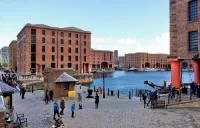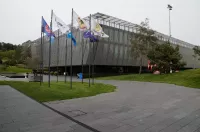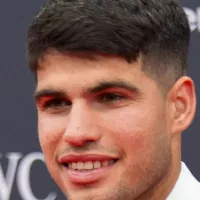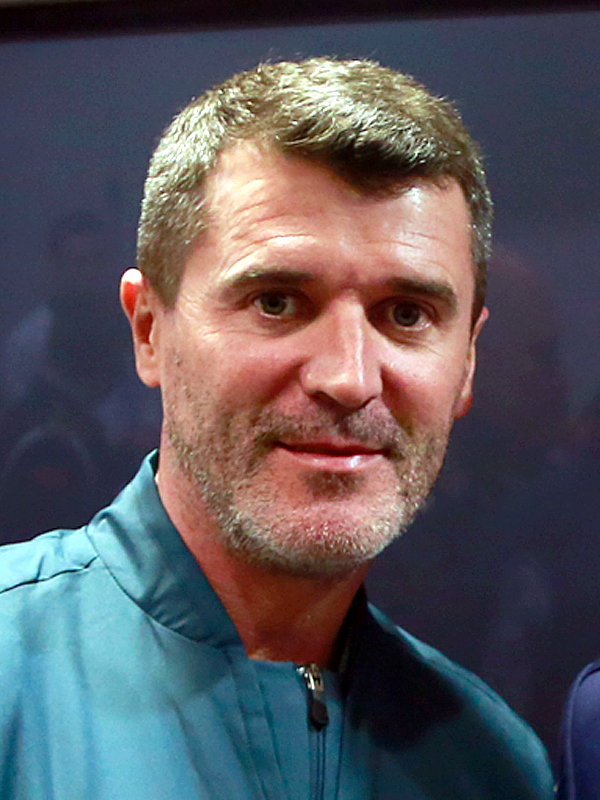Roy Keane is a celebrated Irish football pundit, former coach, and player, renowned for his impactful career in the Premier League, most notably as captain of Manchester United. He is among the most decorated Irish footballers, securing 19 major trophies, with 17 earned during his time at Manchester United. Keane is widely considered one of history's best defensive midfielders and Premier League players, recognized by Pelé in the FIFA 100 list.
1962: Reference to dog relieving itself on Jimmy Greaves
In an article, there was a reference in 1962 to a dog that relieved itself on Jimmy Greaves at the World Cup.
1966: Reference to Pickles the dog
In an article, there was a reference in 1966 to Pickles, the mongrel who dug up the stolen Jules Rimet Trophy.
August 1971: Roy Keane's Birth
In August 1971, Roy Maurice Keane was born in Cork's Mayfield suburb.
August 1989: Cobh Ramblers Senior Debut
In August 1989, Roy Keane made his Cobh Ramblers senior debut in a match against Kilkenny City in the Opel League Cup.
1989: Signed for Cobh Ramblers
In 1989, Roy Keane signed for the semi-professional Irish club Cobh Ramblers after persuasion from Ramblers' youth team manager Eddie O'Rourke.
February 1990: Nottingham Forest Scout Attention
In February 1990, Roy Keane's performance in an FAI Youth Cup match attracted the attention of Nottingham Forest scout Noel McCabe.
1990: Joins Nottingham Forest
In 1990, Roy Keane joined Nottingham Forest and played in the Under-21s team, eventually making his professional league debut against Liverpool.
1991: Becomes Regular Starter for Nottingham Forest
By 1991, Roy Keane was a regular starter for Nottingham Forest, and scored three goals during a run to the 1991 FA Cup Final.
1991: First Call-Up to Under-21s Match
In 1991, Roy Keane was called up for his first game at the international level, an under-21s match against Turkey. He disliked the organization and preparation surrounding the Irish team and had numerous confrontations with the Irish management.
1991: Lowest League Position Since 1991
In 2001-2002 season, Manchester United's third-place finish in the Premier League marked their lowest final position in the league since 1991.
1992: Negotiates Contract with Relegation Escape Clause
In 1992, Roy Keane negotiated a new contract with Nottingham Forest that included a relegation escape clause, and Blackburn Rovers agreed to a £4 million fee for him.
1992: Signs for Manchester United
In 1992, Roy Keane signed for Manchester United.
August 1993: First Goals for Manchester United
On August 18, 1993, Roy Keane scored his first two goals for Manchester United in a 3–0 Premier League win against Sheffield United.
1993: Extended run in Manchester United Team
In 1993, Roy Keane had an extended run in the Manchester United team due to injuries to other players, scoring twice on his home debut and grabbing the winner in the Manchester derby.
1995: Most Experienced Player
In 1995, Roy Keane became the most experienced player in midfield at Manchester United after several player departures and the introduction of younger players.
1995: Red card incident against Gareth Southgate
In 1995, Roy Keane received a red card after stamping on Gareth Southgate during an FA Cup semi-final.
1997: Morrissey's single "Roy's Keen" released
In 1997, Morrissey's single "Roy's Keen" was released, using a pun on Keane's name. Morrissey acknowledged the pun during live performances by changing the lyrics.
1997: Captain of Manchester United
In 1997, Roy Keane became the captain of Manchester United, a position he held until 2005.
1997: Marriage to Theresa Doyle
In 1997, Roy Keane married Theresa Doyle.
1997: Takes Over as Club Captain
In 1997, Roy Keane took over as club captain of Manchester United after Eric Cantona's retirement, though he missed most of the 1997-98 season due to injury.
1998: Missed Matches Due to Knee Injury
Roy Keane missed crucial matches during the 1998 World Cup qualification due to a severe knee injury.
1998: Assistant manager at Manchester United
Steve McClaren served as Alex Ferguson's assistant manager during Keane's time at Manchester United, between 1998 and 2001.
1999: Criticism of Teammates' Focus on Wealth
After a defeat, Roy Keane blamed United's loss of form on his teammates' fixation with wealth in 1999, stating that they had forgotten the game, losing the hunger that earned them material possessions.
1999: Contract Negotiations
In 1999, Roy Keane and Manchester United began prolonged contract negotiations, with Keane turning down an initial £2 million-a-year offer.
1999: Treble win for Manchester United
In 1999, Roy Keane captained Manchester United to win the FA Premier League, FA Cup, and UEFA Champions League, and scored the only goal in the final of the Intercontinental Cup against Palmeiras in Tokyo.
1999: Champions League Semi-Finals
In 2001-2002 season, Manchester United reached the semi-finals of the Champions League, their furthest advance since their successful campaign of 1999.
November 2000: Criticism of Manchester United Supporters
In November 2000, Roy Keane criticized sections of Manchester United supporters after a Champions League victory over Dynamo Kyiv, complaining about their lack of vocal support and suggesting some fans were more interested in "prawn sandwiches" than the game itself, sparking a debate about the changing atmosphere in football grounds.
2000: PFA Players' Player of the Year
In 2000, Roy Keane was voted PFA Players' Player of the Year and FWA Footballer of the Year.
2001: Sent Off for Foul on Alfie Haaland
During the 2001 Manchester derby, Roy Keane was sent off for a knee-high foul on Alfie Haaland, which many viewed as an act of revenge. This resulted in a three-match suspension and a fine from The Football Association.
2001: Trophyless Season for Manchester United
Manchester United finished the 2001 season trophyless for the first time in four years, getting eliminated from the FA Cup and finishing third in the Premier League. They reached the semi-finals of the Champions League but were knocked out by Bayer Leverkusen.
2001: Assistant manager at Manchester United
Steve McClaren served as Alex Ferguson's assistant manager during Keane's time at Manchester United, between 1998 and 2001.
August 2002: Fine and Suspension for Elbowing Jason McAteer
In August 2002, Roy Keane was fined £150,000 and suspended for three matches by Sir Alex Ferguson for elbowing Sunderland's Jason McAteer, and he received an added five-match suspension for controversial comments about Alfie Haaland. He underwent hip surgery during the break.
August 2002: Autobiography Release and Further Punishment
In August 2002, after the release of his autobiography, Roy Keane faced further punishment for admitting he intended "to hurt" Alfie Haaland during the 2001 Manchester derby incident. This resulted in additional sanctions from The Football Association.
November 2002: Mick McCarthy's Resignation
In November 2002, Mick McCarthy resigned as Ireland manager, raising the possibility of Roy Keane's return to the squad.
2002: Release of autobiography
In 2002, Roy Keane released his first autobiography, ghostwritten by Eamon Dunphy.
2002: Sent Home from 2002 FIFA World Cup
In 2002, Roy Keane was sent home from the FIFA World Cup after a dispute with coach Mick McCarthy.
2002: Description of Keane's character
In 2002, Sean O'Hagan of The Guardian described Roy Keane as "a committed and confident warrior on the field, a shy, socially awkward, and often lonely introvert off it."
2002: Saipan incident during FIFA World Cup
In 2002, Triggs came to international attention during the Saipan incident ahead of the FIFA World Cup, which saw Roy Keane leave the squad.
2002: Qualification for 2002 World Cup
Ireland secured qualification for the 2002 World Cup with match-winning performances from Roy Keane, going undefeated against Portugal and the Netherlands.
May 2003: League Title Win After Hip Surgery
After reflecting on his injuries and suspensions, Roy Keane became more restrained on the field and led the team to another league title in May 2003.
April 2004: Return to Irish Team
In April 2004, Roy Keane was brought back into the Irish team by Brian Kerr to face Romania.
2004: Induction into English Football Hall of Fame
In 2004, Roy Keane was inducted into the English Football Hall of Fame, recognizing his significant impact on the English game. He was also selected into the FIFA 100, a list of the greatest living footballers picked by Pelé, being the only Irish player to be selected.
2004: Named in FIFA 100 List
In 2004, Roy Keane was named by Pelé in the FIFA 100 list of the world's greatest living players.
2004: End of Contract
Roy Keane was committed to Manchester United until 2004, after his higher demands were eventually met midway through the 1999–2000 season.
February 2005: 50th Goal for Manchester United
On February 5, 2005, Roy Keane scored his 50th goal for Manchester United in a league game against Birmingham City.
March 2005: Last Goal for Manchester United
On March 12, 2005, Roy Keane scored his last goal for Manchester United in a 4–0 FA Cup win against Southampton.
November 2005: Departure from Manchester United
In November 2005, Roy Keane unexpectedly left Manchester United by mutual consent following an injury and increasing tensions with the management and players after arguing with Ferguson over training camp conditions. He also suggested he might play elsewhere after his contract expired.
December 2005: Signed as Celtic Player
On December 15, 2005, Roy Keane was announced as a Celtic player, the team he supported as a child.
2005: Departure from Manchester United
In 2005, Roy Keane departed from Manchester United after being captain since 1997.
2005: Rivalry with Patrick Vieira at Highbury
In 2005, Roy Keane had a notable incident with Arsenal captain Patrick Vieira at Highbury. This confrontation was fueled by a period of intense rivalry between Manchester United and Arsenal.
January 2006: Celtic Debut
In January 2006, Roy Keane made his debut for Celtic in a 2–1 defeat to Clyde in the Scottish Cup. He criticized some of his new teammates during the match.
May 2006: Testimonial Match at Old Trafford
On May 9, 2006, Roy Keane's testimonial match took place at Old Trafford between Manchester United and Celtic, with United winning 1–0. Keane played the first half for Celtic and the second half for Manchester United, and the proceeds were donated to Irish Guide Dogs for the Blind.
June 2006: Retirement from Professional Football
On June 12, 2006, Roy Keane announced his retirement from professional football on medical advice, just six months after joining Celtic. This prompted praise from former colleagues and managers, including Sir Alex Ferguson.
2006: Retirement from International Football
After failing to qualify for the 2006 World Cup, Roy Keane announced his retirement from international football to prolong his club career.
2006: Keane moved house to Sunderland and reunited with Triggs
In 2006, Roy Keane moved house to Sunderland, and his reunion with his dog Triggs, who joined him later, was noticed by the press.
2006: Retirement as a Player
In 2006, Roy Keane retired as a player after winning the Scottish Premier League and Scottish League Cup with Celtic.
2006: Appointment as Sunderland Manager
In 2006, Roy Keane signed a three-year deal to become the manager of Sunderland after their victory over West Bromwich Albion. He appointed Tony Loughlan as head coach and made six new player signings, including Dwight Yorke and Liam Miller.
January 2007: Sunderland player signings
In January 2007, Roy Keane signed five new players for Sunderland during the transfer window, including Anthony Stokes, Carlos Edwards, and Stern John on permanent contracts, as well as Jonny Evans and Danny Simpson on loan from Manchester United.
March 2007: Criticism of FAI attitude and selection policy
In March 2007, Roy Keane criticized the Football Association of Ireland (FAI) for biased player selection based on media exposure and Dublin origins, alleging that Sunderland player Liam Miller was overlooked due to being from Cork. He also accused the FAI of incompetence.
March 2007: Manager of the Month Award
In March 2007, Roy Keane was rewarded with the Manager of the Month award. Also in March 2007, Roy Keane tackled his players' non-professional approach with a firm hand, leaving three players behind when they were late for the team coach on a trip to Barnsley.
2007: Keane heard of his team's promotion while walking Triggs
In 2007, Roy Keane reportedly heard of his team's promotion to the Premiership while he was walking his dog, Triggs.
September 2008: Controversy with FIFA Vice-President Jack Warner
In September 2008, Roy Keane became embroiled in a row with FIFA Vice-President Jack Warner over the withdrawal of Dwight Yorke from the Trinidad and Tobago national team, with Keane calling Warner "a clown."
December 2008: Resignation from Sunderland
In December 2008, Roy Keane resigned as manager of Sunderland.
2008: Displeasure with Media Work
In 2008, Roy Keane expressed his lack of enthusiasm for media work, stating he would rather go to the dentist than work with commentators like Richard Keys.
February 2009: Resignation as Sunderland Manager
In February 2009, Roy Keane cited differences with Sunderland's shareholder Ellis Short and strains with chairman Niall Quinn as the factors in his decision to resign as Sunderland manager.
April 2009: Manager of Ipswich Town
In April 2009, Roy Keane became the manager of Championship club Ipswich Town.
April 2009: Appointment as Ipswich Town Manager
On April 23, 2009, Roy Keane was appointed as the new manager of Ipswich Town on a two-year contract. His first game in charge was on the following Saturday with a 3–0 away win over Cardiff City.
June 2009: Purchase of house in Ipswich area
In June 2009, Roy Keane and his family announced they would purchase a house in the Ipswich area, settling in Woodbridge.
November 2009: Criticism of Irish reaction to Thierry Henry handball incident
In November 2009, Roy Keane criticized the Irish reaction to Thierry Henry's handball incident during the 2010 World Cup qualifier, also criticizing the Irish team's defence and the FAI authorities.
2009: Triggs appeared in an Irish Guide Dogs advertisement
In 2009, Triggs, Roy Keane's dog, appeared in an Irish Guide Dogs advertisement, with the Irish Examiner referring to her as "football's biggest canine celebrity".
September 2010: Erroneous reports of Triggs' death
In September 2010, there were erroneous reports of Triggs' death from cancer, leading to her being described as a "celebrity" and a "household name", and Keane was reported to be "inconsolable".
2010: Ipswich Town's season
During the 2009-10 season, Roy Keane signed players for Ipswich, including Márton Fülöp and Carlos Edwards, but the team finished 15th after inconsistencies.
January 2011: Departure from Ipswich Town
In January 2011, Roy Keane left his position as manager of Ipswich Town.
January 2011: Dismissal as Ipswich Manager
In January 2011, Roy Keane was dismissed as Ipswich Town manager due to a poor run of form that saw the team drop to 21st in the Championship.
2011: ITV Chief Football Analyst
In the 2011–12 season, Roy Keane became ITV chief football analyst, appearing on nearly every Live ITV match alongside presenter Adrian Chiles and Gareth Southgate.
2012: Death of Labrador Retriever Triggs
In 2012, Roy Keane's Labrador Retriever, Triggs, died, affecting him deeply. He mentioned the loss during a visit to the Irish Guide Dogs for the Blind.
2012: Euro 2012 punditry
Roy Keane worked for ITV during Euro 2012 alongside Patrick Vieira, Roberto Martínez, and Gordon Strachan.
November 2013: Assistant Manager of Republic of Ireland
In November 2013, Roy Keane was appointed assistant manager of the Republic of Ireland national team.
July 2014: Appointment as Aston Villa Assistant Manager
On July 1, 2014, Roy Keane was confirmed as Aston Villa's new assistant manager, working alongside manager Paul Lambert, while also serving as assistant manager for the Republic of Ireland.
October 2014: Release of autobiography "The Second Half"
In October 2014, Roy Keane released the second part of his autobiography, "The Second Half", ghostwritten by Roddy Doyle.
October 2014: Controversy over book release
In October 2014, Roy Keane's book release caused controversy before crucial Euro 2016 qualifiers, though Martin O'Neill dismissed concerns it was a distraction.
November 2014: Resignation as Aston Villa Assistant Manager
On November 28, 2014, Roy Keane quit his role as assistant manager at Aston Villa to concentrate on his assistant manager role with Ireland.
2014: Assistant Manager at Aston Villa
In 2014, Roy Keane had a short spell as assistant manager at Aston Villa.
2015: ITV Punditry Role
From 2015 to 2018, Roy Keane worked for ITV during his time as Republic of Ireland Assistant on UEFA Champions League and UEFA Europa League highlights shows but didn't appear on International Football apart from on the Final of UEFA Euro 2016.
2015: Sale of house in Woodbridge
In 2015, Roy Keane moved out of his property in Woodbridge and offered it for sale.
November 2018: Departure from Republic of Ireland
In November 2018, Roy Keane and Martin O'Neill left their jobs as assistant manager and manager respectively of the Republic of Ireland by "mutual agreement".
2018: End of Assistant Manager Role
In 2018, Roy Keane's role as assistant manager of the Republic of Ireland national team concluded.
January 2019: Appointment as Nottingham Forest Assistant Manager
In January 2019, Roy Keane became assistant manager to Martin O'Neill at Nottingham Forest.
June 2019: Departure from Nottingham Forest
In June 2019, Roy Keane left his role as assistant manager at Nottingham Forest.
September 2019: Joins Sky Sports
In September 2019, Roy Keane joined Sky Sports to work on Super Sunday.
September 2019: Interview with Off the Ball
In September 2019, Roy Keane stated in an interview with Off the Ball that Manchester United were pushing him out of the club due to his age and strained relationships with Carlos Queiroz and Sir Alex Ferguson.
2019: Assistant Manager at Nottingham Forest
In 2019, Roy Keane had a short spell as assistant manager at Nottingham Forest.
2021: Inducted into Premier League Hall of Fame
In 2021, Roy Keane was inducted into the Premier League Hall of Fame.
2021: ITV chief analyst for FA Cup
In 2021-2022, Roy Keane became ITV chief analyst for FA Cup appearing alongside Ian Wright.
2022: ITV chief analyst for FA Cup
In 2021-2022, Roy Keane became ITV chief analyst for FA Cup appearing alongside Ian Wright.
2022: Rejection of Sunderland manager offer
In 2022, Roy Keane turned down the offer to return to Sunderland as manager after negotiations.
September 2023: Alleged headbutting incident at Emirates Stadium
In September 2023, Roy Keane was allegedly headbutted by a man at Emirates Stadium while working as a pundit for Sky Sports.
June 2024: Guilty verdict and sentence for headbutting incident
In June 2024, the man who allegedly headbutted Roy Keane was found guilty, given a three-year football banning order, ordered to complete 80 hours of unpaid work, and pay legal costs plus a victim surcharge.
Mentioned in this timeline

Liverpool is a port city and metropolitan borough located in...
The Guardian is a British daily newspaper founded in as...

Football is a family of team sports primarily involving kicking...

FIFA the F d ration Internationale de Football Association is...
France officially the French Republic is primarily located in Western...
Portugal officially the Portuguese Republic occupies the Iberian Peninsula in...
Trending

59 minutes ago Mikko Rantanen absent as Leijonat seek Olympic bronze after loss to USA.

60 minutes ago Aaron Judge, Bryce Harper, and Manny Machado on MLB's Hot-Seat, Insiders Say
2 hours ago Galatasaray announced Konya squad; Konyaspor match live updates and Süper Lig football.
2 hours ago Roman Anthony expected as Red Sox leadoff hitter in 2026, lineup prediction

2 hours ago Alcaraz Dethrones Rublev, Advances to Doha Final with Unbeaten Streak in 2026
2 hours ago Braves face questions, offer lineup sneak peek for Spring Training opener.
Popular

Jesse Jackson is an American civil rights activist politician and...
Randall Adam Fine is an American politician a Republican who...

Barack Obama the th U S President - was the...

Ken Paxton is an American politician and lawyer serving as...

Bernie Sanders is a prominent American politician currently serving as...

Michael Joseph Jackson the King of Pop was a highly...
